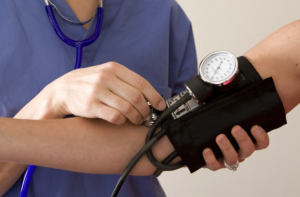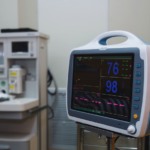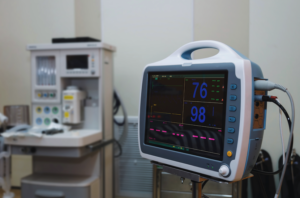 Anxiety disorders affect 40 million adults in the USA.
Anxiety disorders affect 40 million adults in the USA.
Anxiety can make your body feel like you are having a heart attack. Chest based feelings of butterflies to sharp pains are not uncommon.
Anxiety is not healthy in the short term but long term it can cause you to become ill emotionally and physically. Chronic anxiety can raise your risk for heart issues.
While small amounts of stress are healthy and even motivating, feeling worried or anxious now and then is normal. It’s when it becomes chronic that it may pose a negative threat to your wellbeing.
Generalized anxiety disorder is defined by at least 6 months of excessive worrying or feeling anxious about unrelated events. Approximately 5% of adults meet the criteria for this disorder. The incidence is higher, coming in at 11% among those with coronary artery disease and 13% of those with heart failure.
It has not been established whether anxiety sets off heart disease or vice versa. It is known that chronic anxiety can change the way the body reacts to stress. This happens via hormones and physiological reactions meant to keep us safe – known as the flight or fight response.
If your fight or flight response is constantly engaged it can lead to heart issues as well as adrenal burn out which may, in turn, cause other endocrine system issues.
Anxiety can present the same symptoms as a heart attack
A panic attack is so very similar in feel to a heart attack people often mistake them. Upon a trip to the ER, you will receive a diagnosis of non-cardiac chest pain. As many as 1 in 3 people will experience this in their lifetime.
What can you do?
The best answer medical professionals have found so far is a combination of medication and talk therapy. A cognitive-behavioral therapist will help you identify unwanted thoughts and establish what is anxiety-based and what is something that genuinely needs to be looked at and considered.
Medications work as a temporary bandaid to allow you to get through tough anxiety-filled times while working through the root cause with a therapist or on your own using tools such as automatic writing, meditation, yoga, or other relaxation healing based activities.
Never ignore chest pain. It is far better to be safe than sorry. If you are in the Tampa Florida area and looking for a cardiologist we invite you to check out the physicians at Tampa Cardiovascular Associates. www.tampacardio.com 813-975-2800.




 Sugar hits the pleasure center of the brain in the same way that hard drugs do. This makes refined sugar extremely addictive and very hazardous to your health. Moderation is key and elimination even better.
Sugar hits the pleasure center of the brain in the same way that hard drugs do. This makes refined sugar extremely addictive and very hazardous to your health. Moderation is key and elimination even better.
 The temperatures are dropping fast. With the sudden change in weather, our bodies sometimes don’t fully adjust right away. This can put a dent in our immunity and leave us exposed to potential cold and flu viruses going around.
The temperatures are dropping fast. With the sudden change in weather, our bodies sometimes don’t fully adjust right away. This can put a dent in our immunity and leave us exposed to potential cold and flu viruses going around.
 Many of us, during a routine doctor’s appointment, may have been told: “Your blood pressure is a little high”. Monitoring is usually suggested. If it continues to remain high in readings often blood pressure medication is recommended.
Many of us, during a routine doctor’s appointment, may have been told: “Your blood pressure is a little high”. Monitoring is usually suggested. If it continues to remain high in readings often blood pressure medication is recommended.  Chiropractic care is a safe, alternative treatment when applied appropriately. Chiropractic treatments help in dealing with the symptoms of many conditions.
Chiropractic care is a safe, alternative treatment when applied appropriately. Chiropractic treatments help in dealing with the symptoms of many conditions.
 We were all brought up with the four food groups. Meat & Dairy, Grains, Vegetables & Fruits, and “other”. It didn’t include or take into account all of this frozen, premade, and fast food we are bombarded with. While technically they still fall into those groups, these foods are chemically altered, GMO, and preservatived to death. There is little to no nutritional value in a lot of it.
We were all brought up with the four food groups. Meat & Dairy, Grains, Vegetables & Fruits, and “other”. It didn’t include or take into account all of this frozen, premade, and fast food we are bombarded with. While technically they still fall into those groups, these foods are chemically altered, GMO, and preservatived to death. There is little to no nutritional value in a lot of it.
 If your doctor has ever told you “You need an EKG”. You may know the feeling of confusion and worry both in an instant. We do not know how much medical knowledge each of our patients actually have come into our office. We don’t want to insult you by seemingly talking down to you, so sometimes we don’t explain as much as maybe we should.
If your doctor has ever told you “You need an EKG”. You may know the feeling of confusion and worry both in an instant. We do not know how much medical knowledge each of our patients actually have come into our office. We don’t want to insult you by seemingly talking down to you, so sometimes we don’t explain as much as maybe we should.

 Not much was known about the dangers of sugars to the body until recent years.
Not much was known about the dangers of sugars to the body until recent years.